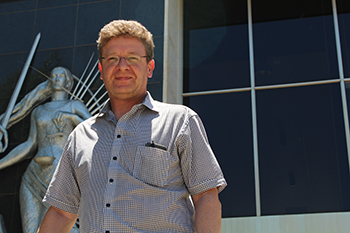Latest News Archive
Please select Category, Year, and then Month to display items
12 January 2024
|
Story Nonsindiswe Qwabe
|
Photo Sonia Small
 Since joining the UFS in 2008, Dr Grey Magaiza has worked extensively on approaches that can foster the socio-economic transformation of societies.
Since joining the UFS in 2008, Dr Grey Magaiza has worked extensively on approaches that can foster the socio-economic transformation of societies.
“The future should be one where communities can decide on their development agenda and futures. That’s the most important for me.” Dr Grey Magaiza, Deputy Director of the Centre for Gender and Africa Studies (CGAS) and Head of the Community Development programme on the Qwaqwa Campus, is passionate about capacitating communities to be agents of change and advancement. His vision for the future emphasises the empowerment of communities to take charge of their development by actively participating in decision making and the implementation of development projects that can improve their lives.
Since joining the UFS in 2008, Dr Magaiza has worked extensively on approaches that can foster the socio-economic transformation of societies. Over the years, he has crafted his research speciality into one that he is most proud of – being an interdisciplinary scientist immersed in the development of communities.
“I’m in a fortunate position of researching what I like. I say ‘fortunate’, because I’ve taken the time to understand what I’m passionate about, which is the overall field of rural livelihoods and livelihood futures – in short, community development. My research starts from an engaged university, understanding the elements that a university must use to enhance transformation and relevance to its immediate community in terms of development.”
One of the ways he has done this is by looking at social entrepreneurship as a development approach for young people in a rural setting. Through workshops with non-profit and civic organisations in Qwaqwa, Dr Magaiza has been helping these organisations to map out their needs and actively meet them through the involvement and support of external role players.
“We understand that communities are part of the national development agenda, but even that national agenda respects community knowledge and intentions and allows communities to shape their identity. A critical enabler of this is community organising. You bring back the capacity in communities to have dialogues on issues affecting them as spaces for engagement, knowledge exchange, and for people to just talk about their way forward.”
By enabling communities to define their development agenda, they can address their specific needs, challenges, and aspirations, he said. “When I look at livelihood futures, it’s quite an exciting aspect of my work – it’s like looking into a fortune tellers’ globe, because you’re not deciding for communities what they should do, but the communities themselves take those decisions.”
Freedom of religion, a constitutional right and area of global concern
2017-01-17

Prof Shaun de Freitas
Photo: Mamosa Makaya
Freedom of religion is enshrined in the South African Constitution, states that everyone has the right to freedom of religion, which more specifically entails the freedom of conscience, religion, thought, belief and opinion. It makes provision for the protection of religious communities in South Africa. Consequently, the maintenance and protection of such a right is of fundamental importance.
Prof Shaun de Freitas, Associate Professor of Law at the University of the Free State (UFS) specialises in constitutional law, with a specific focus on the right to freedom of religion, and has produced several publications in the field. The latest is titled “Transcending the Private-Public School Divide in the Context of the Right to Freedom of Religion in South Africa”, Chapter 19, in Religious Freedom and Religious Pluralism in Africa – Prospects and Limitations published by Stellenbosch University in 2016.
Prejudice a challenge in all societies
There are numerous challenges faced by religious groups around the world concerning prejudice, association with terrorism and political power and influence. Therefore, research in this field becomes important in helping to uphold the rights and freedoms of religious minority groups, to be able to foster understanding between communities.
Balancing responsibility and religious rights
His current focus is on challenges that have arisen in South Africa, more specifically pertaining to the right of medical practitioners to object conscientiously towards participating in certain medical procedures, the parameters of freedom related to religious associations and the inclusion of religious expression in public schools. These matters are also relevant to many other parts of the world (including, ironically enough, those democratic societies that endeavour to make diversity flourish).